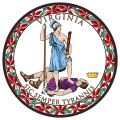History
Although the office has evolved over the years, the job has always involved the safekeeping of the Great Seal of the Commonwealth of Virginia. Under the Virginia Constitution of 1901, the secretary of the Commonwealth was an elected post, along with the governor, lieutenant governor, and attorney general. Under Virginia's current constitution, enacted in 1971, and with the creation of the governor's Cabinet during the administration of Governor A. Linwood Holton Jr., the secretary of the commonwealth has been an appointed member of the governor's Cabinet.
This page is based on this
Wikipedia article Text is available under the
CC BY-SA 4.0 license; additional terms may apply.
Images, videos and audio are available under their respective licenses.














